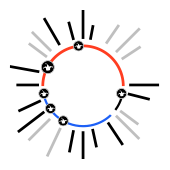OUR
BOTTOM LINE
IS impact
OUR Solutions

Systemic Impact per $ Measurement
Change Makers need to know which investments would yield the highest Impact per $. We calculate the Impact per Dollar on impact investments by getting to the heart of complicated problems and identifying their systemic causes with exacting use of data and evidence.
learn more about the system-based impact per $ method™
Data Science in the Service of Impact
Transforming large datasets into actionable insights is key to understanding social problems and can effectively change how to approach their solutions. Our services include the full range of what analytics have to offer: from bread-and-butter statistics to data-science, adapted to your needs and calibrated towards extracting the most useful insights for your mission.
Knowledge Maps
A product that offers a comprehensive answer to the question of what it would take to actually solve a social problem. Knowledge maps employ the most sophisticated methods available to the scientific community to generate clear and actionable answers to questions such as: What is the real problem? What are its root causes? What do we need to invest in order to solve it? How should each investment be planned in order to get the most impact per dollar?
What Works
The biggest challenge to impacting social change is not lack of resources, but rather that resources are all too often invested in solutions that don’t really work. Our “What Works” products offer a comprehensive mapping of the most effective interventions for achieving real social impact, as well as concrete recommendations on how to use this mapping to design the most effective interventions in a given context
Measurement & Evaluation
How can you tell whether an intervention or policy is really working? We employ advanced quantitative and qualitative methods to determine (a) whether an intervention or policy is working and (b) what needs to be done to improve its effectiveness and efficiency. When evaluating a new intervention, we often offer Randomized Controlled Trials (RCTs) – testing an intervention in the same way you would test a new drug, using randomly allocated treatment and control groups.
Multidimensional Index
Some things are inherently difficult to measure because they are complex. These include poverty, social cohesion and social mobility. We have developed a method to measure the complex, using a multi-dimensional approach that measures the variety of aspects that constitute a complex concept and integrates these aspects into a single quantitative index.
Evidence-Based strategy
Strategy and policy design require clear answers to two questions: “What do we want to achieve?” and “How are we going to get there?” To answer these questions, we begin by crystalizing your goals and objectives and designing dashboards where needed, after which we then turn to the evidence and data on what has worked and failed in the past. We then build upon that knowledge base to articulate an innovative answer to what will work today and in the future.


 +44 (0) 759 889 3094
+44 (0) 759 889 3094  info@eri-institute.com
info@eri-institute.com